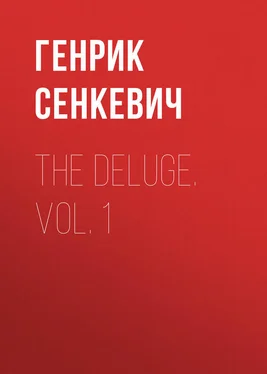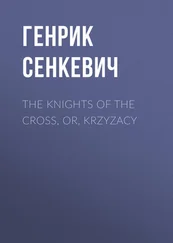Генрик Сенкевич - The Deluge. Vol. 1
Здесь есть возможность читать онлайн «Генрик Сенкевич - The Deluge. Vol. 1» — ознакомительный отрывок электронной книги совершенно бесплатно, а после прочтения отрывка купить полную версию. В некоторых случаях можно слушать аудио, скачать через торрент в формате fb2 и присутствует краткое содержание. Жанр: foreign_antique, foreign_prose, на английском языке. Описание произведения, (предисловие) а так же отзывы посетителей доступны на портале библиотеки ЛибКат.
- Название:The Deluge. Vol. 1
- Автор:
- Жанр:
- Год:неизвестен
- ISBN:нет данных
- Рейтинг книги:4 / 5. Голосов: 1
-
Избранное:Добавить в избранное
- Отзывы:
-
Ваша оценка:
- 80
- 1
- 2
- 3
- 4
- 5
The Deluge. Vol. 1: краткое содержание, описание и аннотация
Предлагаем к чтению аннотацию, описание, краткое содержание или предисловие (зависит от того, что написал сам автор книги «The Deluge. Vol. 1»). Если вы не нашли необходимую информацию о книге — напишите в комментариях, мы постараемся отыскать её.
The Deluge. Vol. 1 — читать онлайн ознакомительный отрывок
Ниже представлен текст книги, разбитый по страницам. Система сохранения места последней прочитанной страницы, позволяет с удобством читать онлайн бесплатно книгу «The Deluge. Vol. 1», без необходимости каждый раз заново искать на чём Вы остановились. Поставьте закладку, и сможете в любой момент перейти на страницу, на которой закончили чтение.
Интервал:
Закладка:
The Teutonic Order was founded in Palestine near the end of the twelfth century to succeed some German hospitallers who had resided in Jerusalem till the capture of the city by Saracens in 1187.
In a few years the new order became military, and under the patronage of Frederick, Duke of Suabia, afterward the Emperor Frederick II., acquired much wealth, with great imperial and papal favor. Under Herman Von Salza, who was grand master from 1210 to 1239, the future of the order was determined, its main scene of action transferred to the West, and that career begun which made the Teutonic Order the most remarkable of the weapon-bearing monks of Europe. Herman Von Salza-a keen, crafty man, of great political astuteness and ambition-had determined to win separate territory for the order, and the dignity of Prince of the Empire for the grand master.
Nothing therefore could be more timely for his plans than the invitation from the Prince of Mazovia, who in 1225 sent envoys to Herman; especially since the order had just been deprived in Transylvania of lands given to support it while warding off heathen Kumanians.
The envoys offered the Teutonic master Culm and some adjoining lands for the order, in return for curbing the Prussians. Herman resolved to accept, should the Emperor prove friendly to the offer. He hastened to Frederick at Rimini, explained the whole question, received a grant in which Konrad's endowment was confirmed; besides the order was given all the land it could conquer and make subject to the Emperor alone. The grand master's next care was to obtain papal approval.
Two envoys from Herman were sent to Poland, where they obtained, as the chronicles of the order relate, a written title to Culm and the neighboring land as well as to all Prussia which they could conquer. Near Torun (Thorn) a wooden fortress was built, called in German Fogelsang (Bird-song). This fortress was the first residence of the knights, who later on had so much power and such influence in the history of Poland.
Only two years later did Herman send his knights to Culm. One of the first acts was to purchase for various considerations, from the Bishop of Plotsk and from Christian, the Bishop of Prussia, their rights over the lands granted them in Culm. The labor of conversion began, and soon the grand master prevailed on the Pope to proclaim throughout Europe a crusade against Prussia.
From Poland alone came twenty thousand men, and many more from other parts of Europe. When the knights had made a firm beginning of work, their design of independence was revealed. They wished to be rid of even a show of submission to the Prince of Mazovia. They raised the question by trying to incorporate the remaining Brothers of Dobjin, and thus acquire the grant given them by Konrad. They had disputes also with Bishop Christian and the Bishop of Plotsk. In 1234 the Bishop of Modena was sent as papal legate to settle the disputes. The legate decided, to the satisfaction of the bishops, that of all lands won from the Pagans two thirds were to be retained by the knights and one third given to the bishops, the church administration being under the order in its own two thirds. For the Prince of Mazovia nothing was left, though he asserted sovereign rights in Culm and Prussia, and would not permit the order to acquire the grant given the Brothers of Dobjin by incorporating the remaining members of that body.
The Teutonic Order would not recognize the sovereignty of the Polish prince, and insisted on incorporating the Brothers of Dobjin. The order, knowing that Konrad would yield only under constraint, placed its possessions at the feet of the Pope, made them the property of the Holy See. This action found success; the Pope declared Culm and all the acquisitions of the order the property of Saint Peter, which the church for a yearly tax then gave in feudal tenure to the Teutonic Knights, who therefore could not recognize in those regions the sovereignty of any secular prince. In August, 1234, the Pope informed Konrad in a special bull of the position of the order, and enjoined on him to aid it with all means in his power. The Polish prince could do nothing; he could not even prevent the incorporation of the majority of the remaining Brothers of Dobjin, and of the lands and property given for their use he was able to save nothing but the castle of Dobjin.
Konrad now found himself in a very awkward position; he had introduced of his own will a foreign and hostile power which had all Western Europe and the Holy See to support it, which had unbounded means of discrediting the Poles and putting them in the wrong before the world; and these means the order never failed to use. In half a century after their coming the knights, by the aid of volunteers and contributions from all Europe, had converted Prussia, and considered Poland and the adjoining parts of Lithuania as sure conquests to be made at their own leisure and at the expense of all Western Christendom.
The first Polish territory acquired was Pomerania. The career of the knights was easy and successful till the union of Poland and Lithuania in 1386. In 1410, at the battle called by the names both of Grünwald and Tannenberg, the power of the order was broken. Some years later Pomerania was returned to Poland, and the order was allowed to remain in East Prussia in the position of a vassal to the Commonwealth. In this reduced state the knights lived for a time, tried to gain allies, but could not; the most they did-and that was the best for the German cause-was to induce Albert, a member of the Franconian branch of the Hohenzollerns, to become grand master. He began to reorganize the order, and tried to shake off allegiance to Poland; but finding no aid in the Empire or elsewhere, he acted on Luther's advice to introduce Protestantism and convert Prussia into a secular and hereditary duchy. This he did in 1525. Poland, with a simplicity quite equal to that of Konrad, who called in the order at first, permitted the change. The military monks married, and were converted into hereditary nobles. Albert became Duke of Prussia, and took the oath of allegiance to Poland. Later the Hohenzollerns of Brandenburg inherited the duchy, became feudatories of Poland as well as electors at home. This was the position during the war between Sweden and Poland described in THE DELUGE. Frederick William, known as the Great Elector, was ruling at that time in Brandenburg and Prussia. He acted with great adroitness and success; paying no attention to his oath as vassal, he took the part of one side, and then of the other when he saw fit. He fought on the Swedish side in the three days' battle around Warsaw in which Yan Kazimir was defeated. This service was to be rewarded by the independence of Prussia.
Hardly had the scale turned in favor of Poland when the Great Elector assisted Yan Kazimir against Sweden; and in the treaty of Wehlau (1657) Poland relinquished its rights over Prussia, which thus became sovereign and independent in Europe. This most important change was confirmed three years later at the peace of Oliva.
Frederick, son of the Great Elector, was crowned "King in Prussia" at Königsberg in 1701. The Elector of Brandenburg became king in that territory in which he had no suzerain.
At the first division of Poland, Royal Prussia of The Deluge, the territory lying between the Vistula and Brandenburg, went to the new kingdom; and Brandenburg, Pomerania, and Prussia became continuous territory.
The early success of the Teutonic Knights was so great that in the third half century of their rule on the Baltic their power overshadowed Poland, which was thus seriously threatened. Toward the end of the fourteenth century, however (1386), the Poles escaped imminent danger by their union with Lithuania and Russia. Through this most important connection they rose at once from a position of peril to one of safety and power.
Читать дальшеИнтервал:
Закладка:
Похожие книги на «The Deluge. Vol. 1»
Представляем Вашему вниманию похожие книги на «The Deluge. Vol. 1» списком для выбора. Мы отобрали схожую по названию и смыслу литературу в надежде предоставить читателям больше вариантов отыскать новые, интересные, ещё непрочитанные произведения.
Обсуждение, отзывы о книге «The Deluge. Vol. 1» и просто собственные мнения читателей. Оставьте ваши комментарии, напишите, что Вы думаете о произведении, его смысле или главных героях. Укажите что конкретно понравилось, а что нет, и почему Вы так считаете.











